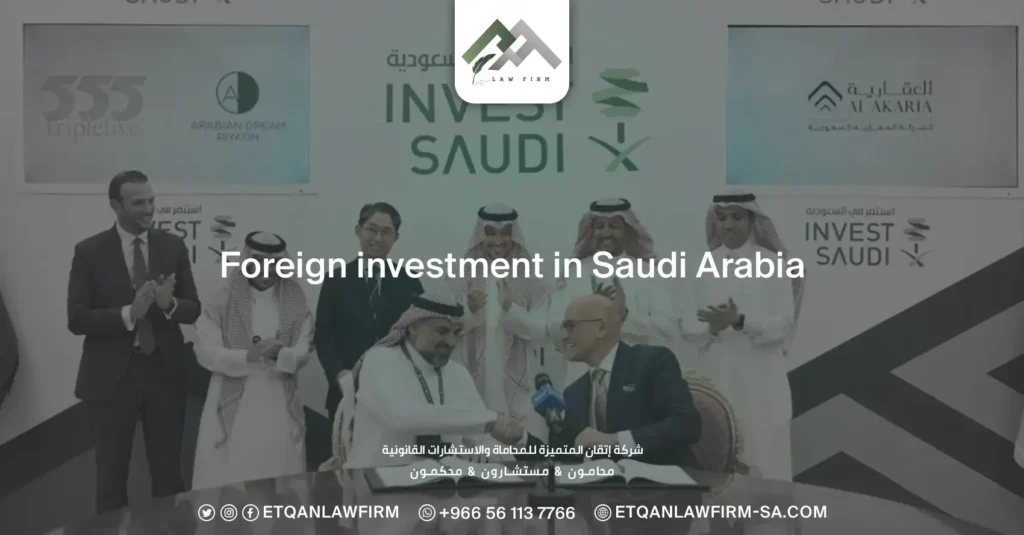
Foreign investment in Saudi Arabia is rapidly gaining global attention due to the Kingdom’s strategic vision, attractive incentives, and its commitment to economic diversification under Vision 2030. As one of the largest economies in the Middle East, Saudi Arabia offers foreign investors a promising environment that combines legal protection, infrastructure development, and access to a growing market.
Whether you are a multinational corporation or an ambitious entrepreneur. This article provides a comprehensive guide to everything you need to know about Foreign investment in Saudi Arabia.
المحتويات
- 1 Requirements for Foreign Investment in Saudi Arabia?
- 2 Main Sectors and Fields for Foreign Investment in Saudi Arabia
- 3 The Advantages Enjoyed by Foreign Investors in Saudi Arabia
- 4 The Requirements for Foreign Investors to Obtain a License in Saudi Arabia
- 5 What Documents Must a Foreign Investor Submit with the License Application?
- 6 What does Etqan Law Firm offer to foreign investors wishing to invest in Saudi Arabia?
- 7 FAQ
Requirements for Foreign Investment in Saudi Arabia?
If you’re considering foreign direct investment in Saudi Arabia, there are several essential requirements you need to be aware of before getting started, there are several basic requirements you should know before starting, including the following:
1. Establishing a Legal Entity in the Kingdom
Foreign investment in Saudi Arabia without having an officially recognized business entity. This entity can either be fully owned by the foreign investor or formed in partnership with a Saudi national. In both cases, the entity must meet all the legal requirements set by the relevant authorities in the Kingdom.
2. Obtaining the Necessary Licenses
Securing an investment license is one of the most critical steps, and it must be obtained from the Ministry of Investment. After that, the company must be registered with the Ministry of Commerce to become a legally recognized business in Saudi Arabia.
3. Meeting the Minimum Capital Requirement
Foreign investment in Saudi Arabia requires a certain amount of minimum capital, which varies depending on the sector and the nature of the intended business activity. Some sectors require substantial capital, while others may have more moderate requirements.
4. Complying with Saudi Laws and Regulations
Foreign investment in Saudi Arabia must adhere to all applicable Saudi laws, including those related to investment, labor, environment, and consumer protection. Understanding and complying with the legal and regulatory environment in the Kingdom is essential for operating without legal complications.
5. Being Aware of Restricted Sectors
Some sectors in Saudi Arabia are restricted for foreign investment in Saudi Arabia and require special approvals from relevant authorities before any investment is made. These sectors include oil and gas, telecommunications, and certain mining activities. It’s important to consult the official list of permitted activities and ensure your project aligns with the regulations.
6. Respecting Intellectual Property Rights
Intellectual property such as trademarks, patents, and copyrights is strictly protected under Saudi law. Foreign investors are required to respect these rights both their own and those of others to avoid any legal liabilities or disputes.
Read also: Conditions to Buy Property in Saudi Arabia for Foreigners
Main Sectors and Fields for Foreign Investment in Saudi Arabia
Saudi Arabia opens its doors to foreign investors across a wide array of economic sectors, aligned with its ambitious Vision 2030 to diversify the economy and enhance the business environment. The Kingdom offers attractive investment opportunities in various industries. Below is a comprehensive overview of the key sectors available for foreign investment in Saudi Arabia:
1. Industrial Sector: This sector includes various manufacturing activities such as pharmaceuticals and food production. It also covers supportive operations like industrial, food, and pharmaceutical laboratories, and warehouses. Foreign investors may also engage in the trade of cosmetics, medications, and medical supplies and equipment.
2. Commercial Sector: This sector offers diverse opportunities, including precious metals trading, operation of commercial laboratories, professional consulting services, and other specialized services that meet local and international market demands.
3. Healthcare Sector: Opportunities include investment in hospitals, medical centers, and clinics of various specialties. There is significant encouragement for developing healthcare infrastructure and public-private partnerships.
4. Information and Communication Technology (ICT) Sector: Encompasses modern technology activities like wireless internet services, digital infrastructure development, smart application logistics, and parcel transportation services. It is one of the fastest-growing sectors in the Kingdom.

5. Media Sector: This field includes advertising, printing, production, and sale of software and digital content. It offers room for innovation in digital publishing and media production.
6. Transport and Logistics Sector: This vital sector includes land transport for goods and passengers, as well as port-related activities such as maritime agency operations and ship supply services. The government supports this sector through initiatives to ease cross-border trade.
The Advantages Enjoyed by Foreign Investors in Saudi Arabia
When a foreign investor enters the Saudi market, they are not treated as outsiders or secondary players. Instead, they enjoy the same rights, incentives, and guarantees granted to local investors, in accordance with the official regulations outlined in the Foreign Investment in Saudi Arabia Law and its Executive Regulations, Among the benefits he receives are the following:
1. Equal Treatment with Local Investors: Foreign investors are entitled to all the benefits, incentives, and protections available to national projects. This means Saudi Arabia offers a fair and transparent investment environment to all.
2. Freedom to Transfer Profits and Capital Abroad: Foreign investors have the right to freely transfer their shares, profits, or liquidation surplus abroad whether from selling the business, winding it up, or distributing annual profits. They may also transfer funds related to contractual obligations of the project without restrictions, as long as it is done lawfully.
3. Right to Own Required Real Estate: Foreign investors are allowed to own properties necessary for operating their licensed business or for housing staff, as per the regulations governing non-Saudi ownership of real estate in the Kingdom. This provides operational stability and infrastructure flexibility.
Check out: Discover The Types of Business Licenses in Saudi Arabia
4. Sponsorship of Non-Saudi Employees: The licensed foreign entity is responsible for the sponsorship of the investor and their non-Saudi employees, simplifying administrative procedures and providing operational convenience.
5. Benefit from International Agreements: Foreign investors benefit from Saudi Arabia’s international treaties, such as double taxation avoidance agreements and investment protection and promotion agreements, offering added legal assurance.
6. Strong Legal Protection: Foreign investment in Saudi Arabia cannot be expropriated or seized fully or partially without a judicial ruling or unless it serves the public interest, and even then, only with fair compensation. These protections support long-term, stable investments.
7. Tax Incentives in Certain Regions: Projects located in regions like (Hail, Najran, Jazan, Al-Baha, Al-Jawf, and the Northern Borders) benefit from tax advantages, including:
- A 10-year tax exemption.
- A 50% tax deduction on annual training costs for Saudi employees.
To qualify, projects must meet conditions like a paid-up capital of at least SAR 1 million and proper audited financial statements.
The Requirements for Foreign Investors to Obtain a License in Saudi Arabia
According to Article 6 of the Executive Regulations of the Foreign Investment in Saudi Arabia, foreign investors must meet specific criteria to be granted an investment license. These conditions ensure that the investor and the proposed project are compatible with the Kingdom’s economic objectives:
- The Activity Must Be Permitted
The foreign investment in Saudi Arabia must not be listed among the sectors restricted or excluded from foreign investment. - Product Compliance with Standards
The technical specifications and production methods must align with Saudi, GCC, or recognized international standards. - No Serious Legal Violations
The investor must not have any final judgments or decisions issued against them related to major violations, whether within or outside Saudi Arabia. - Clean Financial and Commercial Record
There should be no history of financial or commercial offenses resulting in final judgments in the investor’s home country or in the Kingdom. - Commitment to Regulations and Declarations
The investor must agree to all terms, regulations, declarations, and undertakings included in the official investment license application form. - Alignment with National Investment Goals
The proposed foreign investment in Saudi Arabia must support the Ministry of Investment’s broader goals, such as economic diversification, job creation, and sustainable growth.
What Documents Must a Foreign Investor Submit with the License Application?
As outlined in Article 7 of the Executive Regulations, a foreign investor or their legal representative must complete the investment license application electronically through the Ministry of Investment. The following documents must be submitted in Arabic or translated into Arabic by a certified translation office in the Kingdom:
1. Commercial Registration and Articles of Incorporation
A certified copy of the commercial registration and incorporation documents from the investor’s home country, attested by relevant authorities and the Saudi Embassy.
2. Trade Name Reservation Certificate
A copy of the trade name reservation from the Saudi Ministry of Commerce.
3. Draft of the Articles of Association
For limited liability companies, a draft of the Articles of Association must be submitted.
4. Bylaws for Joint-Stock Companies
If the entity is a joint-stock company, the draft bylaws and incorporation documents must be provided.
5. Partners’ Resolution to Invest in Saudi Arabia
A formal resolution by the partners expressing their intention to invest in Saudi Arabia. This document should include partner names, capital contributions, ownership percentages, business activity, headquarters location, appointment of the general manager, and their authority. It must be certified by the appropriate authorities and the Saudi Embassy.
6. General Manager’s Passport Copy
A valid passport copy of the appointed general manager.
7. Saudi Partners’ Identification Documents
If one of the partners is Saudi, copies of their national ID, family ID, and commercial registration or civil record extract (to verify profession) must be included.
8. Preliminary Approvals for Regulated Activities
For certain regulated sectors, preliminary approval from the relevant Saudi ministry or authority is required.

9. Comprehensive Business Plan
The investor must submit a detailed business plan that clearly outlines:
- The project’s potential contribution to Saudi Arabia’s GDP.
- Job creation targets and expected workforce numbers.
- Saudization plans across departments and management levels.
- The scope of services and added value to consumers.
- The strategic significance of the project to the region and city in which it will be based.
- Number of planned branches, training programs, estimated setup costs, and required funding.
What does Etqan Law Firm offer to foreign investors wishing to invest in Saudi Arabia?
Etqan Law Firm offers a comprehensive range of legal services tailored to support foreign investors in establishing successful ventures in Saudi Arabia, including:
- Specialized legal expertise in foreign investment in Saudi Arabia regulations, delivered by a fully integrated team of experienced lawyers and legal consultants.
- Comprehensive support for establishing foreign investment in Saudi Arabia entities, whether:
- In partnership with a Saudi investor, or
- Fully owned by a foreign investor.
- Facilitation of licensing procedures and compliance with the legal requirements of the Saudi Ministry of Investment and related authorities.
- Advisory on investment incentives, including helping investors obtain all benefits, guarantees, and privileges granted under Laws on foreign investment in Saudi Arabia.
- Strategic legal structuring to ensure the project aligns with Saudi legal frameworks and minimizes legal risks.
- Assistance with investment feasibility planning, by guiding the investor in using the investment calculator to assess the project’s financial viability before formal setup.
- Legal alignment of business plans, ensuring that economic goals (such as GDP contribution, Saudization, job creation, etc.) are matched with regulatory expectations.
- Ongoing legal consultancy to support investors throughout the lifecycle of their business in Saudi Arabia.
Learn about: Best Law Firms In Saudi Arabia: Etqan Lawfirm – 0553320060
Conclusion:
Foreign investment in Saudi Arabia represents a gateway to one of the region’s most dynamic and forward-looking economies. With a legal framework that ensures transparency, equality with local investors, and strong protections against expropriation, the Kingdom continues to attract global interest. For those seeking legal clarity and procedural efficiency, Etqan Law Firm stands ready to provide comprehensive support.
The Etqan Al Mutamayza Law Firm is ready to provide the essential support you need. You can reach their team at the following mobile numbers: +96656113776, +966541110440, +966504315333.
Additionally, feel free to visit our branches located at:
- Jeddah: Al-Aziziyah District, Mohammed bin Abdulaziz Street (Tahlia)
- Riyadh: King Abdulaziz Street, across from the Kingdom Tower
- Dammam: Al-Ashri’a Street, Al-Badeea, Dammam 32415.
FAQ
1. Can a foreigner invest in Saudi Arabia?
Yes, Foreigners can invest in Saudi Arabia with 100% ownership in many sectors, provided they obtain an investment license from the Ministry of Investment (MISA).
2. Which country invests the most in Saudi Arabia?
Currently, the United Arab Emirates (UAE) and the United States are among the top investors in Saudi Arabia, especially in energy, infrastructure, and services.
3. How much foreign investment does Saudi Arabia have?
Saudi Arabia has over $250 billion in total foreign direct investment (FDI), with annual inflows reaching approximately $32 billion.
4. Does Saudi Arabia’s economy benefit from foreign investments?
Yes, Foreign investment in Saudi Arabia contributes to economic diversification, job creation, technology transfer, and GDP growth, aligning with the goals of Vision 2030.
